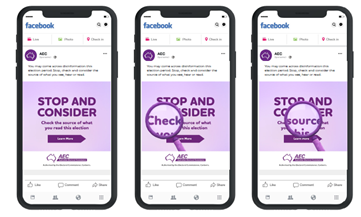Australian Electoral Commission


The Australian Electoral Commission has today begun its campaign to help voters to Stop and Consider the messages they receive during this federal election.
Electoral Commissioner Tom Rogers says the AEC’s Stop and Consider campaign, which builds on the success of a similar campaign run at the 2019 federal election, aims to help voters cut through misinformation, disinformation and spin.
“A lot of information is designed to make you feel an emotional reaction like shock, excitement or anger,” Mr Rogers said.
“It’s normal to react to things we come across but before acting on it every one of us should take the time to Stop, check and appropriately consider it.”
“Since federation Australian voters have had to assess information attempting to influence their vote. The channels are different but the voter’s job is the same – to Stop and Consider.”

The AEC is encouraging voters to think about three things when they encounter electoral communication:
“While it’s not the AEC’s role to regulate truth in political advertising, we do recognise that misinformation and disinformation are features of modern election campaigns,” Mr Rogers said.
“The Stop and Consider campaign gives voters the tools they need to navigate an increasingly complex electoral landscape.”
Advertising will be distributed to voters primarily online via their social media feeds and through digital displays. Advertising is being supported by translated material distributed through Culturally and Linguistically Diverse audiences.

The AEC’s YouTube channel AEC TV has a number of short-form videos that educate Australians about the electoral process and address electoral disinformation.


The Stop and Consider page on the AEC website is a key resource for voters. There is a wealth of information to access as well as infographics, a fact sheet and frequently asked questions.
The AEC also has a disinformation register that lists prominent pieces of disinformation regarding the election process. Details include when the communication was brought to our attention and action taken.
“While the AEC cannot be the arbiter of truth in political communication we are very active in correcting disinformation about the processes we run,” Mr Rogers said.
The AEC’s active and, at times, forthright approach to social media engagement is a key part of combatting electoral mis and disinformation online.
In addition to responding to people who tag the AEC’s accounts, we are using keywords to monitor conversations outside of our accounts. We will occasionally jump in to those conversations to provide facts about how electoral processes work.